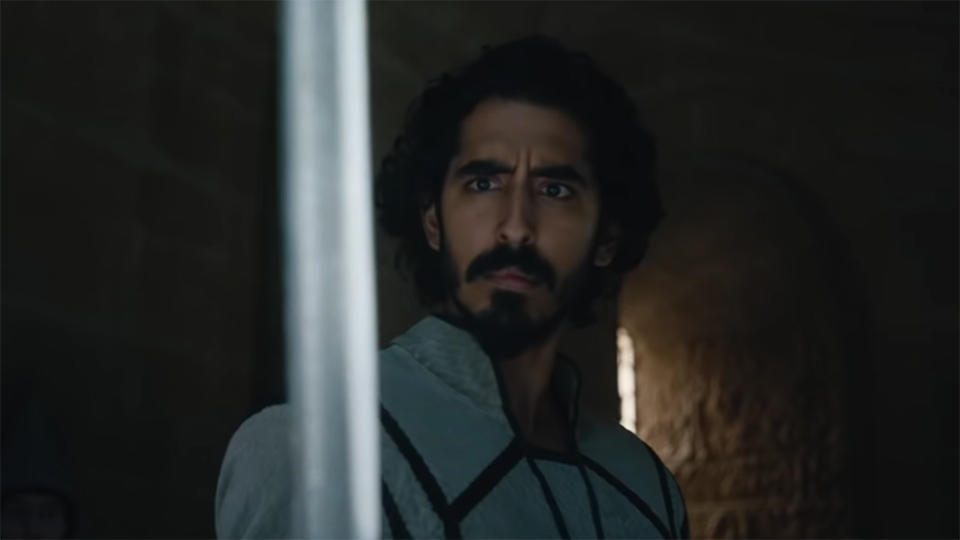‘The Green Knight’ Review: Dev Patel Decapitates His Destiny in David Lowery’s Arthurian Masterpiece

- Oops!Something went wrong.Please try again later.

in which King Arthur’s overeager adult nephew learns that the world is weirder and more complicated than he ever thought possible, “The Green Knight” is an intimate epic told with the self-conviction that its hero struggles to find at every turn. Stoned out of its mind and shot with a genre-tweaking mastery that should make John Boorman proud, it’s also the rare movie that knows exactly what it is, which is an even rarer movie that’s perfectly comfortable not knowing exactly what it is.
The surreal genius of David Lowery’s “filmed adaptation of the chivalric romance by anonymous” (to quote the on-screen text) is that it fully embraces the unresolved nature of its 14th century source material, contradictory interpretations of which have coexisted in relative harmony for more than half a millennium. Is it a paganistic tale about the fall of man, or is it a Christ-like quest about the hope for salvation? Does it bow to chivalry as a noble bulwark against man’s true nature, or does it laugh at the idea that a knight’s code would ever be a sound defense against his deeper urges? Is it a misogynistic poem about manipulative witches, or a proto-feminist ode to women’s power over men?
More from IndieWire
From 'Old' to 'The Green Knight,' the Summer's Most Daring Movies Tackle Our Universal Fear of Death
'The Suicide Squad' Review: James Gunn Delivers the Least Depressing Superhero Movie in a Long Time
To all these questions and more, Lowery rousingly answers “yes!” And yet what makes “The Green Knight” grow in your mind (like moss; like rot) for days after watching it is that Lowery never equivocates at any point along Sir Gawain’s journey from the Round Table to the forest citadel where his fate awaits. Instead, he pulls tight on the tangled knots that have bound this saga to our collective imagination for so many centuries, and braids them all into a timeless fantasy about the struggle to make sense of an irreconcilable world. Hypnotic from its fiery start to its gut-punch of a finale and polished with a hint of heavy metal that makes the whole thing shimmer in the darkness like a black light poster in the basement of your friend’s parents’ house, “The Green Knight” might ride into theaters on 600 years’ worth of unsettled history, but Lowery makes it feel brand new by re-saddling it as a personal story about someone who’s just trying to become the kind of man he can live with, even if it kills him.
The film’s self-conflicted and vaguely sinister energy is on full display from the very first shot, as the young Gawain (a scruffy Dev Patel) is introduced sitting on King Arthur’s throne and waiting for his own legend to be told; when the telling actually begins, however, the narrator’s demonic growl announces that we aren’t in for a simple tale of honor and glory. From there, “The Green Knight” opens like a house on fire, as Andrew Droz Palermo’s sinuous camera finds Gawain shirking his knightly duties as he sleeps away Christmas day in a brothel while his beautiful paramour Esel (Alicia Vikander sporting one of cinema’s strongest pixie cuts this side of Faye Wong) whispers sweet nothings in his ear. Cries of “Christ is born!” follow them through the dank hallways, but there’s no sign of Jesus here.
Patel’s Gawain isn’t quite as godly as medieval scholars might recall; an entitled young heir to the throne who fears he’s not meant for the greatness that’s expected of him, this Gawain has less in common with King Arthur than he does Kendall Roy, and his swagger evaporates the moment he joins the legendary knights who fill his uncle’s dining hall. The term “Impostor Syndrome” won’t be coined for another few centuries, so Gawain will have to navigate his feelings of unworthiness as if he’s the first person who’s ever hid them beneath his chainmail.
Arthur (played by a kind, wheezing, and wonderfully human Sean Harris) and his Guinevere (the great Kate Dickie, not letting us get too comfortable) want to know more about their nephew, but Gawain insists that he has no stories to tell. And then, as if answering her son’s prayers from afar, Gawain’s enchantress mother (Sarita Choudhury) writes its first chapter for him, as she summons a hulking warrior to stride into the castle on horseback and request a friendly game from the bravest soul there.
Inimitably voiced by “The Witch” star Ralph Ineson, the Green Knight in Lowery’s film is a marvelous creation who anticipates the imagination-tickling wonder that seeps through so much of the tale to come. Endowed with the body of a giant and the head of an Ent, this emerald-hued forest hulk emits a benevolence that rubs against the threat he poses to any man who stands in his path, and evokes one of the forest gods from “Princess Mononoke” even before we see how grass sprouts from the cobblestone under his feet. When he offers a free strike at him, with the only caveat being that he’ll return the same blow exactly one year hence, our boy Gawain leaps to his feet and — temporarily — lops off the Knight’s head. In just one clean swing, Gawain’s thirst for immortality has left him with only 12 months to live.
There’s a bit of Robert Ford in Gawain’s rattled infamy, and Daniel Hart’s exquisite score — a percussive squall of steeled nerves and seasick nightmares in the shadow of churning violin storm clouds — enriches the texture of Patel’s quavering performance. Few actors have better embodied a man who’s so at war with his own integrity, and so much of our excitement as Gawain rides out to find the Green Knight stems from how Patel complicates our hopes for his character’s quest. Do we want him to learn about honor the hard way and get decapitated for his insolence, or would we rather he somehow avoid the redress for which he so gallantly volunteered his own head? Not even Gawain seems to know which fate he deserves, or if he prizes the title of becoming a knight more than he does the honor required to earn it. It’s little wonder that a story about someone running afoul of their virtue for a measure of social clout should feel so intrinsically modern.
So much of our excitement also comes from the dream-like charge that Lowery sews into every scene of Gawain’s journey. Long and languid shots of Patel riding across the Irish countryside cast a spell that slows your heartbeat and prepares your mind for the somnambulant haze of the adventure to come — this is one of those movies that insists there should be an Oscar for Best Location Scouting. Gawain’s brush with a plucky miscreant (played by Barry Keoghan) on a corpse-strewn battlefield is equal parts “The Mists of Avalon” and “Come and See,” while a jaw-dropping encounter with a clan of bald-headed giants borrows from René Laloux’s “Fantastic Planet” as the film’s (relatively) grounded first half gives way to the unmoored fantasy of its second.
The lo-tech visual trickery of that last effect epitomizes how Lowery creates a spellbinding Arthurian world that speaks to the 21st century without surrendering to it. There are some obvious dashes of CGI here and there — Gawain’s WETA-designed fox companion doesn’t quite pay off in a way that justifies its unreality — but it’s telling that the film’s most powerful moments are produced in-camera. One especially memorable shot finds Gawain bound with rope on the floor of a forest, as the camera pans 360 degrees clockwise to discover that Gawain has turned into a skeleton, and then undoes this sorcery by spinning counter-clockwise back to where things were. Even at its simplest, “The Green Knight” is haunted by a spectral awareness of time’s judgement; of the veiled threat the people we might become tomorrow seem to pose against the people we are today.
That same conditional frisson is on full display throughout the film’s wordlessly stunning 15-minute finale, and — in Gawain’s eerie meeting with the ghost of St. Winifred (Erin Kellyman), who’s looking for her skull — the people we were yesterday are factored into the mix as well. In “The Green Knight,” no one is ever just one thing. Vikander’s wide-eyed performance as the poor Esel, for example, is made all the more powerful by the actress’ later appearance as a horny seductress from the opposite side of the economic spectrum. What might sound like the film’s most carnal stretch instead becomes its most ethereal, as Gawain’s manhood is tugged at and tested in a way that leaves him wondering if the virtue he aspires to might beget its own kind of violence.
Like all of the questions that confront him along his way to the Green Citadel, Gawain will ultimately have to work out the answer for himself. “The Green Knight” grapples with so many of the contradictions that have attended to the poem for several hundred years, but the film’s merciless beauty — its severed head, and throbbing heart — are rooted in the eternal fact that life is ever too wild to agree with itself. No code of honor can smite out all selfishness. No human laws can exist beyond the reach of nature. No reality can come to pass without the fantasy required to fuel it.
In this movie, as in the legend that inspired it, every interaction hinges on an unequal exchange of some kind. Lowery’s unforgettable adaptation refuses to do the math for us, but it’s all the more thrilling for how it insists that the only true value of a thing in this world is that which we find in it for ourselves. “Are you real, or are you spirit?,” Gawain asks St. Winifred somewhere along his path between spoiled brat and Arthurian legend, “What is the difference?,” she snorts back. “I just need my head.”
Grade: A-
A24 will release “The Green Knight” in theaters on Friday, July 30.
Best of IndieWire
New Movies: Release Calendar for July 23, Plus Where to Watch the Latest Films
Cannes 2021 Deals: The Complete List of Festival Acquisitions
Sign up for Indiewire's Newsletter. For the latest news, follow us on Facebook, Twitter, and Instagram.


